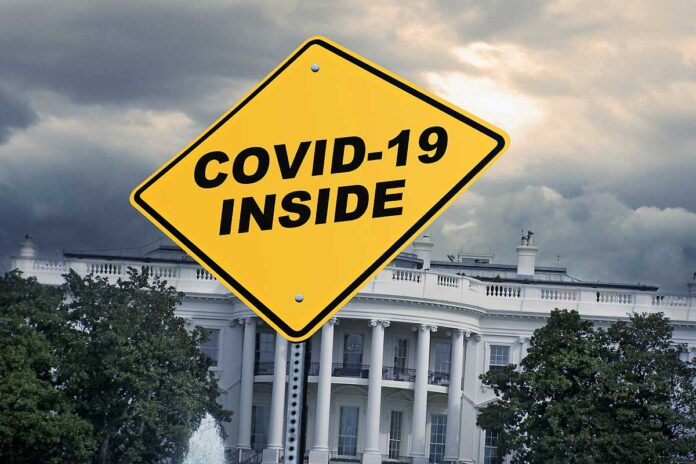
By Stacy M. Brown, NNPA Newswire Senior National Correspondent
The virus is “coming from inside the White House,” blared the latest headline from The Atlantic, one of a multitude of news organizations to cover the surreal events surrounding President Donald Trump’s coronavirus diagnosis and subsequent behavior.
“Asking whether the celebration of Amy Coney Barrett’s [U.S. Supreme Court] nomination was a ‘super-spreader’ event misses the point: Trump’s irresponsibility made this crisis likely,” The Atlantic continued.
In his motorcade around Walter Reed Hospital in Bethesda, Maryland, Trump’s ill-advised ride raised alarm bells inside and out of the White House and is only one incident in many that points to an administration in disarray.
Dr. Sean Conley, who heads the White House medical team, told reporters that doctors had begun treating the President with dexamethasone, a steroid that the medical experts said is usually reserved for those with the most severe cases of Covid-19.
Information from the World Health Organization (WHO) notes that dexamethasone can suppress the immune system and is “potentially harmful for patients who take it too early” after their COVID diagnosis.
Trump announced a positive test on October 1 and, within two days, began the steroid treatment.
“Trump’s dexamethasone drug is risky if used early,” tweeted Epidemiologist and Health Economist Dr. Eric Feigl-Ding.
“The WHO warns that this drug used by Trump is a powerful anti-inflammatory for ‘severely ill and critical patients,’ and can also increase viral replication too and make Covid-19 worse.”
Richard Stengel, an under Secretary of State in President Barack Obama’s administration and an editor at Time, suggested that Trump’s condition may have approached a fatal point.
“I’m not a doctor, but throwing an experimental antibody cocktail, plus dexamethasone, plus remdesivir, plus supplemental oxygen all at the same time suggests the house was on fire and they had to put it out. Not one of the 7 million Americans infected got the same treatment,” Stengel determined.
Dr. Megan Ranney, an emergency physician at the Rhode Island Hospital and an associate professor at Brown University, said dexamethasone could cause psychosis and mania.
She also called some of Trump’s behavior, like the joyride around Walter Reed, “certainly concerning.”
Added Dr. Vin Gupta, a member of the faculty at the University of Washington’s Institute for Health Metrics and Evaluation: “The treatment the doctors report they administered suggest the president has COVID pneumonia of at least mild severity.”
Despite his unhealthy condition, Trump briefly left the hospital on October 4 and rode in his motorcade up and down Rockville Pike in Bethesda, Maryland.
White House press secretary Kayleigh McEnany announced she had tested positive for the coronavirus.
While the President had previously referred to the virus that has claimed more than 210,000 American lives as a hoax, he’s sending mixed signals about just how serious he’s taking his own diagnosis.
It wasn’t immediately known what Trump’s personal physicians at Walter Reed Medical Center thought of the President’s impromptu trip outside of the hospital, but other doctors expressed disbelief.
“It’s all ridiculous,” noted an exasperated Dr. Ebony Hilton, an associated professor of Anesthesiology and Critical Care Anesthesia at the University of Virginia School of Medicine.
“If Donald Trump were my patient, in unstable condition with a contagious illness, and he suddenly left the hospital to go for a car ride that endangers himself and others, I’d call security to restrain him and then perform a psychiatric evaluation to examine his decision-making capacity,” declared former Baltimore City Health Commissioner Dr. Leana Wen.
“This is infuriating,” blasted Dr. Taison Bell, an emergency department physician specializing in Pulmonary and Critical Care Medicine at the University of Virginia.
“The White House is past the point of just making wrong decisions at almost every juncture. They are now literally making up ways to do irresponsible things.”
Tweeted Harvard Medical School graduate, Dr. Michael McClurkin:
“I cannot believe the President endangered his staff by asking them to drive him around the block to take photographs. He’s mad.”
Trump’s handling of his coronavirus diagnosis has even infuriated the Secret Service, a federal agency charged with protecting the President.
Three agents, who spoke to CNN on the condition of anonymity, expressed outrage at the President’s hospital antics.
The network noted that agents have tested positive for the virus while traveling for Trump’s political rallies, which he insisted on maintaining even against federal health guidelines.
According to CNN, as employees self-quarantine or isolate in place, others have been forced to work longer hours to fill the void.
“That should never have happened,” one current Secret Service agent who works on the presidential and first family detail said after Trump’s drive-by, adding that those agents who went along for the ride would now be required to quarantine.
“I mean, I wouldn’t want to be around them,” the agent said, according to CNN, expressing a view that multiple people at the Secret Service also voiced in the wake of the October 4 appearance.
“The frustration with how we’re treated when it comes to decisions on this illness goes back before this, though. We’re not disposable.”
Another veteran Secret Service agent also expressed deep dismay at the Walter Reed ride. However, he was sympathetic for those around the President, given the difficulty in pushing back on the commander-in-chief.
“You can’t say no,” the agent said.
While agents in the Secret Service have the power to say no to activities that could put a president in danger, they can’t say no in situations that could put themselves in danger.
A third agent told CNN: “It was simply reckless.”



